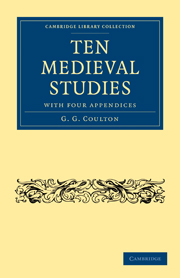Book contents
- Frontmatter
- PREFACE TO FIRST EDITION (1906)
- PREFACE TO SECOND EDITION (1915)
- PREFACE TO THIRD EDITION
- Contents
- I The Monastic Legend
- II A Revivalist of Six Centuries Ago
- III Side-Lights on the Franciscans
- IV The High Ancestry of Puritanism
- V Romanism and Morals
- VI The Truth about the Monasteries
- VII Religious Education before the Reformation
- VIII Priests and People before the Reformation
- IX The Failure of the Friars
- XIII The Plain Man's Religion in the Middle Ages
- Appendices
- Index
VIII - Priests and People before the Reformation
Published online by Cambridge University Press: 07 September 2010
- Frontmatter
- PREFACE TO FIRST EDITION (1906)
- PREFACE TO SECOND EDITION (1915)
- PREFACE TO THIRD EDITION
- Contents
- I The Monastic Legend
- II A Revivalist of Six Centuries Ago
- III Side-Lights on the Franciscans
- IV The High Ancestry of Puritanism
- V Romanism and Morals
- VI The Truth about the Monasteries
- VII Religious Education before the Reformation
- VIII Priests and People before the Reformation
- IX The Failure of the Friars
- XIII The Plain Man's Religion in the Middle Ages
- Appendices
- Index
Summary
It is difficult for the modern Englishman to realize, even remotely, the power of the medieval clergyman in his parish. Theoretically it was almost unlimited, and practically it was even greater if possible than that which Mr McCarthy reveals in his Priests and People in Ireland. In 1287, Bishop Quivil, of Exeter, published a series of diocesan constitutions which not only summarize the most important points of English Church law, but also add very valuable illustrative comments. These detailed instructions, dealing simply with the pressing needs of the moment, and in no way concerned with a distant posterity, throw, perhaps, more light upon medieval parish life than any other document of equal length. Just as the good bishop has no doubt that Jews are born to be the servants of Christians, so also he does not hesitate to remind the laity very plainly of their filial subordination to the clergy, a subordination which aggravates the sin of every trespass upon clerical possessions or privileges.
Unhappy wretches, walking in darkness!…is it not written in the Scriptures “he that stealeth anything from his father or from his mother, and saith,‘This is no sin’, is the partner of a murderer”? That man therefore is a murderer who robs Church money by rapine or cozenage. Is it not a plain sign of strange madness when the son seeks to set himself over his father, the disciple over his master! and when they would fain subjugate by unjust obligations him who (as they believe) can bind or loose them not on earth only but also in heaven!
- Type
- Chapter
- Information
- Ten Medieval Studieswith Four Appendices, pp. 123 - 165Publisher: Cambridge University PressPrint publication year: 2010First published in: 1930



